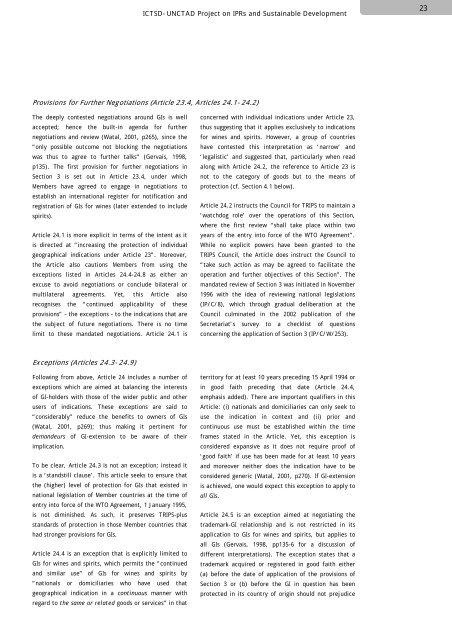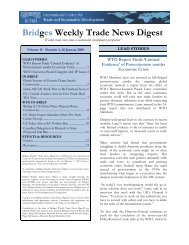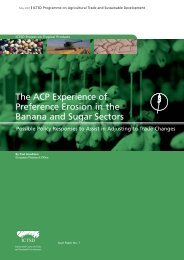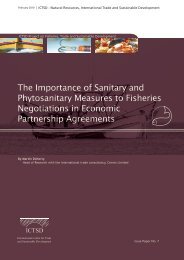Geographical Indications
Geographical Indications
Geographical Indications
Create successful ePaper yourself
Turn your PDF publications into a flip-book with our unique Google optimized e-Paper software.
ICTSD-UNCTAD Project on IPRs and Sustainable Development23Provisions for Further Negotiations (Article 23.4, Articles 24.1-24.2)The deeply contested negotiations around GIs is wellaccepted; hence the built-in agenda for furthernegotiations and review (Watal, 2001, p265), since the“only possible outcome not blocking the negotiationswas thus to agree to further talks” (Gervais, 1998,p135). The first provision for further negotiations inSection 3 is set out in Article 23.4, under whichMembers have agreed to engage in negotiations toestablish an international register for notification andregistration of GIs for wines (later extended to includespirits).Article 24.1 is more explicit in terms of the intent as itis directed at “increasing the protection of individualgeographical indications under Article 23”. Moreover,the Article also cautions Members from using theexceptions listed in Articles 24.4-24.8 as either anexcuse to avoid negotiations or conclude bilateral ormultilateral agreements. Yet, this Article alsorecognises the “continued applicability of theseprovisions” – the exceptions – to the indications that arethe subject of future negotiations. There is no timelimit to these mandated negotiations. Article 24.1 isconcerned with individual indications under Article 23,thus suggesting that it applies exclusively to indicationsfor wines and spirits. However, a group of countrieshave contested this interpretation as ‘narrow’ and‘legalistic’ and suggested that, particularly when readalong with Article 24.2, the reference to Article 23 isnot to the category of goods but to the means ofprotection (cf. Section 4.1 below).Article 24.2 instructs the Council for TRIPS to maintain a‘watchdog role’ over the operations of this Section,where the first review “shall take place within twoyears of the entry into force of the WTO Agreement”.While no explicit powers have been granted to theTRIPS Council, the Article does instruct the Council to“take such action as may be agreed to facilitate theoperation and further objectives of this Section”. Themandated review of Section 3 was initiated in November1996 with the idea of reviewing national legislations(IP/C/8), which through gradual deliberation at theCouncil culminated in the 2002 publication of theSecretariat’s survey to a checklist of questionsconcerning the application of Section 3 (IP/C/W/253).Exceptions (Articles 24.3-24.9)Following from above, Article 24 includes a number ofexceptions which are aimed at balancing the interestsof GI-holders with those of the wider public and otherusers of indications. These exceptions are said to“considerably” reduce the benefits to owners of GIs(Watal, 2001, p269); thus making it pertinent fordemandeurs of GI-extension to be aware of theirimplication.To be clear, Article 24.3 is not an exception; instead itis a ‘standstill clause’. This article seeks to ensure thatthe (higher) level of protection for GIs that existed innational legislation of Member countries at the time ofentry into force of the WTO Agreement, 1 January 1995,is not diminished. As such, it preserves TRIPS-plusstandards of protection in those Member countries thathad stronger provisions for GIs.Article 24.4 is an exception that is explicitly limited toGIs for wines and spirits, which permits the “continuedand similar use” of GIs for wines and spirits by“nationals or domiciliaries who have used thatgeographical indication in a continuous manner withregard to the same or related goods or services” in thatterritory for at least 10 years preceding 15 April 1994 orin good faith preceding that date (Article 24.4,emphasis added). There are important qualifiers in thisArticle: (i) nationals and domiciliaries can only seek touse the indication in context and (ii) prior andcontinuous use must be established within the timeframes stated in the Article. Yet, this exception isconsidered expansive as it does not require proof of‘good faith’ if use has been made for at least 10 yearsand moreover neither does the indication have to beconsidered generic (Watal, 2001, p270). If GI-extensionis achieved, one would expect this exception to apply toall GIs.Article 24.5 is an exception aimed at negotiating thetrademark-GI relationship and is not restricted in itsapplication to GIs for wines and spirits, but applies toall GIs (Gervais, 1998, pp135-6 for a discussion ofdifferent interpretations). The exception states that atrademark acquired or registered in good faith either(a) before the date of application of the provisions ofSection 3 or (b) before the GI in question has beenprotected in its country of origin should not prejudice









